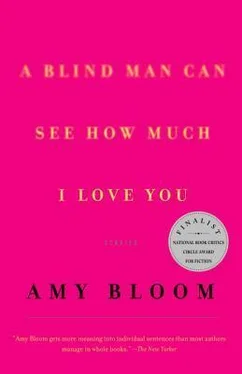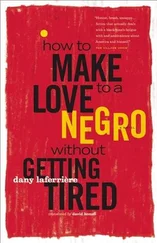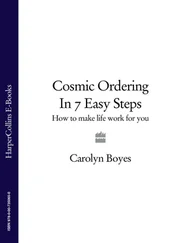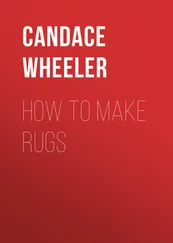They never finish the charades game. Corinne and Jordan and Ari collapse on the floor after dinner, socks and shoes scattered, one of Corinne’s bronze roses askew, the other in Ari’s sneaker. Ari and Jordan have dismantled the couch. Jewelle and Buster gather the three of them, wash their faces, drop them into pajamas, and put them to bed. They kiss their beautiful, damp children, who smell of soap and cornbread and lemon meringue, and they kiss Ari, who smells just like his cousins.
Buster says, “Do we have to go back down?”
“Are you okay?”
“Just stuffed. And I’m ready to be with just you.” Buster looks at his watch. “Lionel’s long knives ought to be coming out around now.”
“Do you think we ought to hang around for your mother?”
“To protect her? I know you must be kidding.” It’s all right with Jewelle if Buster thinks they’ve cleaned up enough; the plates are all in the kitchen, the leftover turkey has been wrapped and refrigerated, the candles have been blown out. It’s not her house, after all.
Lionel washes, Julia dries. They’ve been doing it this way since he was ten, and just as he cannot imagine sleeping on the left side of a bed or wearing shoes without socks, he cannot imagine drying rather than washing. Julia looks more than tired, she looks maimed.
“If your hand’s hurting, just leave the dishes. They’ll dry in the rack.”
Julia doesn’t even answer. She keeps at it until clean, dry plates and silver cover the kitchen table.
“If you leave it until tomorrow, I’ll put it all away,” Lionel says.
Julia thinks that unless he really has become someone she does not know, everyone will have breakfast in the dining room, and afterward, sometime in the late afternoon when Buster and his family have gone and it’s just Lionel and Ari, when it would be nice to sit down with a glass of wine and watch the sun set, she will be putting away her mother’s silver platter and her mother-in-law’s pink-and-gold crystal bowls, which go with nothing but please the boys.
Lionel and Julia talk about Buster and Jewelle’s marriage, which is better but less interesting than it was, and Buster’s weight problem, and Jewelle’s languishing career as a painter, and Odean Pope’s Saxophone Choir, and Lionel’s becoming counsel for a Greek shipping line.
Lionel sighs over the sink, and Julia puts her hand on his back. “Are you all right? Basically?”
“I’m fine. You don’t have to worry about me. I’m not a kid.” He was about to say that he’s not really a son, any more than he’s really a father, that these step-ties are like long-distance relationships, workable only with people whose commitment and loyalty are much greater than the average. “And you don’t have to keep worrying about … what was. It didn’t ruin me. It’s not like we would ever be lovers now.”
Julia thinks that all that French polish is not worth much if he can’t figure out a nicer way not to say that he no longer desires her, that sex between them is unthinkable not because she raised him, taught him to dance, hemmed his pants, and put pimple cream on his back, but because she is too old now for him to see her that way.
“We were never lovers. We had sex,” she says, but this is not what she believes. They were lovers that night as surely as ugly babies are still babies; they were lovers like any other mismatched and blundering pair. “We were heartbroken and we mistook each other for things we were not. Do you really want to have this conversation?”
Lionel wipes down the kitchen counters. “Nope. I have never wanted to have this conversation. I don’t want anything except a little peace and quiet — and a Lexus. I’m easy, Ma.”
Julia looks at him so long he smiles. He is such a handsome man. “You’re easy. And I’m tired. You want to leave it at that?”
Lionel tosses the sponge into the sink. “Absolutely. Take care of your finger. Good night.”
If it would turn him back into the boy he was, she would kiss him good night, even if she cut her lips on that fine, sharp face.
“Okay. See you in the morning. Sleep tight.”
Julia takes a shower. Lionel drinks on in the kitchen, the Scotch back under the sink in case someone walks in on him. Buster and Jewelle sleep spoon-style. Corinne has crawled between them, her wet thumb on her father’s bare hip, her small mouth open against her mother’s shoulder. Jordan sleeps as he always does, wrestling in his dreams whatever he has failed to soothe and calm all day. His pillow is on the floor, and the sheets twist around his waist.
Julia reads until three a.m. Most nights she falls asleep with her arms around her pillow, remembering Peaches’ creamy breasts cupped in her hands or feeling Peaches’ soft stomach pressed against her, but tonight, spread out in her pajama top and panties, she can hardly remember that she ever shared a bed.
Ari is snuffling in the doorway.
“Come here, honey. Viens ici, chéri.” It is easier to be kind to him in French, somehow. Ari wears one of Buster’s old terry cloth robes, the hem trailing a good foot behind him. He has folded the sleeves back so many times they form huge baroque cuffs around his wrists.
“I do not sleep.”
“That’s understandable. Je comprends.” Julia pats the empty side of the bed, and Ari sits down. His doleful, cross face is handsome in profile, the bedside light limning his Roman nose and straight black brows.
“Jordan hate me. You all hate me.”
“We don’t hate you, honey. Non, ce n’est pas vrai. Nous t’aimons.” Julia hopes that she is saying what she means. “It’s just hard. We all have to get used to each other. Il faut que nous ….” If she ever had the French vocabulary to discuss the vicissitudes of divorce and future happiness and loving new people, she doesn’t anymore. She puts her hand on Ari’s flat curls. “Il faut que nous faisons ton connaissance.”
She hears him laugh for the first time. “That is ‘how do you do.’ Not what we say en famille. ”
Laughing is an improvement, and Julia keeps on with her French — perhaps feeling superior will do him more good than obvious kindness — and tries to tell Ari about the day she has planned for them tomorrow, with a trip to the playground and a trip to the hardware store so Lionel can fix the kitchen steps.
Ari laughs again and yawns. “I am tired,” he says, and lies down, putting his head on one of Julia’s lace pillows. “Dors bien,” the little boy says.
“All right. You too. You dors bien.”
Julia pulls the blankets up over Ari.
“At night my mother sing,” he says.
The only French song Julia knows is the “Marseillaise.” She sings the folk songs and hymns she sang to the boys, and by the time she has failed to hit that sweet, impossible note in “Amazing Grace,” Ari’s breathing is already moist and deep. Julia gets under the covers as Ari rolls over, his damp forehead and elbows and knees pressing into her side. She counts the books on her shelves, then sheep, then turns out the bedside lamp and counts every lover she ever had and everything she can remember about them, from the raven-shaped birthmark on the Harvard boy’s ass to the unexpected dark brown of Peter’s eyes, leaving out Peaches and Lionel Senior, who are on their own, quite different list. She remembers the birthday parties she gave for Lionel and Buster, including the famous Cookie Monster cake that turned her hands blue for three days, and the eighth-grade soccer party that ended with Lionel and another boy needing stitches. Already six feet tall, he sat in her lap, arms and legs flowing over her, while his father held his head for the doctor.
Читать дальше












